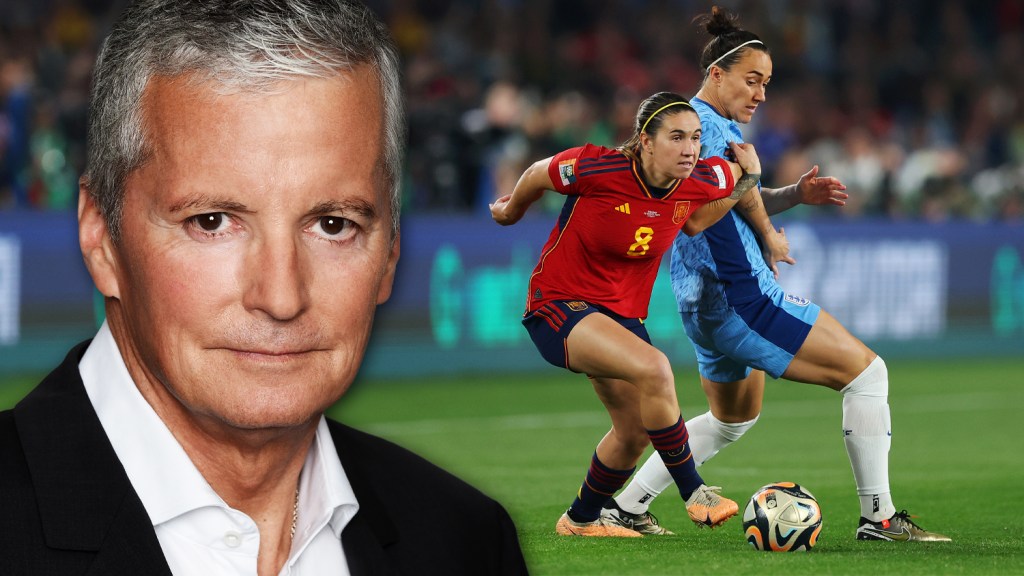The 2023 Women’s World Cup drew record viewership for Fox, despite challenging time zones and an early elimination for the U.S. team, ending with the most-watched non-USWNT final ever for English-language U.S. television.
The accomplishment capped a decade-long career milestone for executive producer David Neal, who has been dedicated to making soccer a mainstay in the U.S. since Fox acquired the English-language broadcasting rights from FIFA in 2011.
“I think that other than the U.S. players themselves, the person who deserves the most credit for the Women’s World Cup becoming a major event in this country is David Neal,” Michael Mulvihill, Fox’s president of insights and analytics, told Deadline while speaking about the challenges that the broadcaster faced this year with the Women’s World Cup. “He knows how to produce him in a way that makes it a cultural touchstone.”
Related Stories

2023 Premiere Dates For New & Returning Series On Broadcast, Cable & Streaming

FIFA Suspends Spanish Soccer Federation President Luis Rubiales For Unwanted Kiss
Before joining Fox, Neal spent three decades producing live sports for NBC, including nine Olympics, four NBA Finals, two World Series and a Super Bowl pregame show. And over the past decade, Neal has largely contributed to the rise of interest in professional soccer in the Unites States. This year’s WWC numbers followed a record breaking audience for the 2022 World Cup final between Argentina and France.
And, of course, there’s the massive audience that tuned in to watch the USWNT take home the trophy in 2015 — which is still the number to beat, by the way, as its the most-watched soccer match in U.S. history.
The 2023 Women’s World Cup marked Neal’s last at Fox, as he steps down from his position just as U.S. interest in soccer is expected to peak with North America hosting the men’s tournament in 2026. The U.S. has also submitted a bid to host the Women’s World Cup with Mexico in 2027.
Neal spoke with Deadline about the years spent producing the World Cup for U.S. audiences, the key to those record-breaking numbers, and his predictions for the future of soccer in the States.
DEADLINE: Can we start by talking about when Fox first acquired the English-language rights to the World Cup? What were the goals and the vision for what soccer could be in the U.S.?
DAVID NEAL: The timeline is that Fox acquired the rights in 2011. I had just left NBC after a 30-plus year career to move back to California, because I did NBC in New York. So I got out here, and had a meeting with the legendary David Hill, who is the person who founded Fox Sports, and Eric Shanks who’s now the CEO and executive producer. So that would have been in late 2011. At that time, they made it very clear to me that the World Cup FIFA rights were going to be what we refer to as the ‘Crown Jewels’ of Fox Sports, along with the Super Bowl, the World Series, and the Daytona 500. They both made it clear to me that they wanted the Women’s World Cup to be treated on the exact same level, the same resources, the same amount of care as the Men’s World Cup. That was something that, then, was still a fairly unique position for a major network to take. So that was my marching orders from the very outset was to make the Women’s World Cup just as big as the Men’s World Cup. There was a disparity at the time. The Women’s World Cup was gaining some traction, but it certainly wasn’t being presented on the level as the men. So that, for me, was a very clear mandate to go do what needed to be done to make both World Cups that we had in each four year cycle equally big.
DEADLINE: So, what needed to be done?
NEAL: My background at NBC, the last 10 years I was there, I was the EVP of the Olympics. The storytelling mantra that I had brought over with me to Fox was the first thing we concentrated on and that was, we looked at the current U.S. Women’s National Team and realized what a dynamic group it was — group that had just lost out in the World Cup final in 2011 to Japan. They lost in the most heartbreaking way in a penalty kick shootout at the end of regulation and had their hearts broken against Japan. But this was a team that had veteran leadership in Abby Wambach and up and comers like Alex Morgan and Carli Lloyd. It just seemed clear to us that, as a sports team, this group was ready to dominate. They just needed the experience of going through 2011 so that they were going to be ready in 2015.
So from my standpoint, looking at the overall production, and also from our marketing departments, led by the great Robert Gottlieb, we went in and met with the team. Jill Ellis, who was the coach, skeptically allowed Robert and his marketing team and me and my production team to come in and meet with the players in 2014, a year before the Women’s World Cup, and to explain to them our vision. Robert Gottlieb went and said, ‘This is a group of badass women athletes. You guys are great. We’re going to celebrate [you].’ I explained that, from the Olympics background that I had, storytelling really means giving viewers a reason to care and that what we wanted to do was shoot athlete profiles with them…so that we can introduce them to the U.S. audience and give the U.S. audience a vested interest in how they perform. They all said, ‘We’re in.’ Even though they played in the Women’s World Cup in 2011, leading into 2015, we wanted to really introduce that team in a big way to our viewers.
DEADLINE: And of course, they won in 2015. So going into 2019, audiences really did take such an interest in the team.
NEAL: In sports, American viewers love a winner. They love teams that go out and just dominate. So the quest in 2015 was a little bit like, ‘We gotta get going here. It’s been 16 years.’ So there was some pressure on them, but then when they won in 2015, all of a sudden now they’re the ones who everybody’s trying to knock off. It became an interesting dynamic. They went from the chasers to the ones who were being chased. You’re absolutely right. By the time 2019 was over, and some of the memorable performances…they came out as a strong two-time defending world champions with a chance to make it an unprecedented third.
DEADLINE: So that brings us to this World Cup. How did you pivot your plan once the U.S. was unexpectedly eliminated so early on to make sure audiences were still invested?
NEAL: We use a device called the 33rd team. We had to expand an experiment we’d had to implement in 2018 when the U.S. Men’s Team failed to qualify for the World Cup. The whole premise is that there’s 32 teams and they’re the heroes and the villains, the protagonists and antagonists. But then the 33rd character is the host country, and particularly in a place like Russia or France or Sydney, Australia, American viewers still have that sort of National Geographic interest in places that are not familiar to them. So in 2018, we had National Geographic, which was still in our corporate portfolio at that time… come with us. He pre-shot a lot of different things around the country. The mood and attitude was a lot different there than it is now. So we were able to shoot a lot of stories about Russian people, Russian landscape, Russian monuments, all that sort of thing. So when the women went out early in round of 16 in Australia, we knew going in that it was certainly a possibility, because they were not as strong a group as they had been together in their prime in 2019. So we knew that we had to have this idea of leaning on the country as the 33rd character in case it happened. So when it did, we started really celebrating Australia [and] the wonderful ride that the Matildas, the Australian national team, had to get themselves all the way to the semi-finals. That was something that created its own momentum. So we rode that wave. We spent enough time making sure that viewers knew about England and Sweden and Australia. When we didn’t have the U.S. team to lean on, we leaned on the magnificence of the tournament, which really was one of the greatest Women’s World Cup tournaments of all time. It’s one of the greatest tournaments regardless of gender of all time. It’s not what you want. You love to see the U.S. go right to the final, but when they went out, we still had half a tournament to go. So we shifted our operational strategy.
DEADLINE: The time zones also made this a pretty challenging World Cup for U.S. audiences. Some of the USWNT matches were played in primetime, but plenty of the big matches between other countries were also in the middle of the night. How do you operate at that disadvantage?
NEAL: Well, you just accept that that’s one of the things that you literally have no control over. I did the Olympics in Sydney 2000 with NBC. There was a bit of a tape delay mentality still in our business back then. So we put the primetime show on time delay for 16 nights from Sydney, which was hard because primetime was airing in the U.S., but you’d already started another day of competition in Sydney. So it was really a time warp. But at that time, it was accepted that you wanted to get your best stuff into primetime and that’s what advertisers expected. So that’s what we did. Clearly now, 23 years later, that’s no longer the case. Viewers want it available live. The night the U.S. went out to Sweden in the middle of the night in round of 16, we had something like 2 million viewers. The show peaked at 2.4 million. Given the context of the fact that it was overnight, those are still pretty strong numbers.
DEADLINE: If we look back at last year, the Men’s World Cup also had such a strong audience in the U.S. even though the USMNT didn’t make it very far. And they certainly didn’t have the winning streak the women did. What was happening with that?
NEAL: First of all, the timezone differences weren’t as bad. But it’s the fact that there are more worldwide, instantly identifiable name brand athletes on the men’s side — Lionel Messi, Kylian Mbappé, Cristiano Ronaldo…That shows that the job isn’t done in terms of building up the women’s game. There are all sorts of great women players in the Women’s World Cup, and we just need to do a better job of making American viewers familiar with them so if the U.S. does go out early again, you can hang your hat on these other international players the same way that we were able to ride worldwide interest in whether Messi would finally get that one missing trophy. Would he get the World Cup? And would he do it against this dynamic French side, which had won the previous World Cup? So that story sort of sold itself. England versus Australia in the final would have been that sort of dynamic. It would have been close to it, anyway, because England and Australia are two countries that U.S. fans are really familiar with and have a rooted interest in. But we need to do a better job producing all the international storylines.
DEADLINE: Speaking of Messi, what does him coming to play for the MLS fresh off that World Cup title do for soccer interest in the U.S.?
NEAL: Lionel Messi is like Muhammad Ali or Michael Jordan level. People worldwide around the globe would instantly recognize who he is. To see him come to the U.S. and have such a spectacular start, that’s fairytale stuff. Those stories are hard to write. I think it definitely helped.
DEADLINE: So, the next World Cup will be hosted by North America. The U.S. has also submitted a bid to host the Women’s World Cup the following year. What will this do to solidify soccer in the U.S. on a larger level?
NEAL: There’s no substitute for a friendly timezone. This is a simple fact. So having games played in U.S. time periods will make it much more user friendly, and there’s no doubt they will drive enormous returns. I still think — maybe this is just my personal interest — but I still think that the number that we received for the Women’s World Cup final in 2015 where Carli Lloyd’s hat trick knocked off Japan to avenge us four years prior and to be the winner of the U.S. for [the first time in] 16 years…that number, which is 28.5M viewers, will be a tough number to beat. Unless you get the U.S. men in the final with the World Cup here in the U.S., and then that number would probably be in jeopardy, but that’s a pretty strong number.
DEADLINE: You came to Fox with decades of experience producing live sports, but I wonder if there’s something you learned after specifically working on the World Cup for a decade?
NEAL: I think the big difference between the Olympics and the World Cup [is that] the Olympics attracts almost an equal number of non-sports fans as sports fans. The Olympics is still sort of primetime storytelling. That feels a little bit different than straight sports, where the viewership in large measure is so knowledgeable that you really have to respect the fact that a large percentage of your viewers know and live that sport day-by-day. They eat, sleep and breathe it. With a World Cup, because the United States is usually in it, you’re gonna get casual fans, but the percentages are different. The Olympics is sort of a safe bet to play to a larger audience who may not know the difference between a modern pentathlon and a 100-meter sprint. With the World Cup, you’re not doing multiple sports. You’re doing just one sport, so you got fans who are very knowledgeable [and] you have to strike that balance. You don’t want to ever talk down to the audience that knows what’s going on, but at the same time…we always said that if someone stumbles onto one of our World Cup shows, we don’t want them to feel like they’ve come to a secret panel where we’re using coded language to speak. It’s got to still be language and explanations and storytelling that are easily understood.
Must Read Stories
‘Holdovers’, ‘Rustin’, ‘Saltburn’, ‘Nyad’ In Lineup; Barry Jenkins On Festival’s First 50 Years
Damien Chazelle Talks Strikes, Wears Guild T-Shirt; Luca Guadagnino; Latest Galleries
Sean Penn, Dakota Johnson, Nicolas Cage Expected At TIFF Thanks To Interim Agreements
Sets Fall Movie Dates For ‘The Killer’, ‘Pain Hustlers’, Wes Anderson Pic & More
Read More About:
Source: Read Full Article






